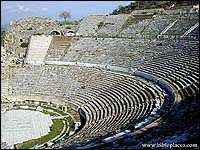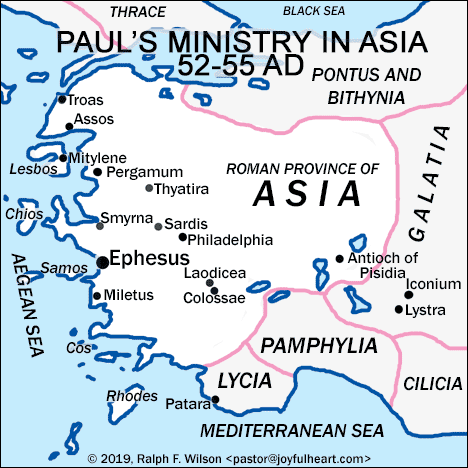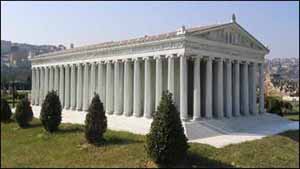
|
Old Testament
New Testament
Gospels
Acts
Paul's Letters
General Letters
Revelation
Topical Studies
Beginning the Journey (for new Christians). en Español

|
Old Testament
New Testament
Gospels
Acts
Paul's Letters
General Letters
Revelation
Topical Studies

|
Home
Bible Studies
Articles
Books
Podcasts
Search
Menu
Donate
About Us
Contact Us
FAQ
Sitemap
 The amphitheater at Ephesus could seat 24,000 people (Acts 19:29ff). |
In the estimation of many, Ephesians is Paul's crowning work, "the quintessence of Paulinism."1 It is both a literary gem and a treasure of spiritual nuggets. Those who study it may not fully plumb its depths, but will glean important understanding of Christ and his Church, as well as lessons for life.
Before we get into the book itself, let's see what we can learn about it.
Authorship
On the surface, authorship may seem self-evident, since the first sentence reads rather clearly: "Paul, an apostle of Christ Jesus by the will of God....." For 18 centuries Paul's authorship was uncontested. But since F.C. Bauer questioned Pauline authorship in 1845, it has become popular in some circles to deny that Paul was the author and speculate about others. In fact, these days the majority of critical scholars deny Pauline authorship for several reasons:
- Language. Ephesians includes a number of words not found in other Pauline letters.
- Style. The first half of the Letter, especially, has a full and lofty style, unlike other Pauline letters.
- Theology. The Letter's view of Christ is cosmic in scope and the author's understanding of the Church, too, is advanced.
- Colossians. Many elements of Ephesians are similar to Colossians, so much that some scholars see "borrowing" from the ideas in Colossians.
- Personal References. Unlike Paul's other letters, Ephesians doesn't include greetings to various believers in the church to which he was writing.
Of course, each of these objections can be answered by those who believe Paul to be the author. Paul is a highly educated man, quite able to express himself in different ways, depending upon his knowledge, the revelation he is seeking to express, and the heresies he desires to combat. If you consider the different styles and language usage skilled communicators are capable of today, it's not hard to grant those abilities to Paul. The theology is not discontinuous with other Pauline letters, but builds on them, reflecting growth in understanding that comes from both revelation and theological reflection resulting in a bigger vision of Christ and his church. And as for borrowing from Colossians ... if Paul is the author of both Colossians and Ephesians, the concept of borrowing becomes pretty silly.
There are two very good reasons to see Paul as the author of Ephesians.
1. Tradition. Ephesians was considered authored by Paul from the earliest days of the church, and quoted by the earliest of the Apostolic Fathers -- Clement of Rome, Ignatius, Hermas, and Polycarp. Even the non-orthodox acknowledged it as Pauline -- Marcion, Gnostic writers, the Nag Hammadi documents, and others. In the early church, Pauline authorship was never once questioned.
2. Autobiographical information. Paul claims to be the author (Ephesians 1:1), and reflects on his "stewardship of the mystery" (Ephesians 3:2-6), the nature of his apostolic ministry (Ephesians 3:7-13), his imprisonment (Ephesians 3:1; 4:1; 6:20), his first-person appeals and prayers for his readers, his request for prayer (Ephesians 6:21-22), and his comments about Tychicus. The literary device of pseudonymity may have been common in the early Christian centuries in some accepted Christian documents, but deliberate deception? Since the author claims to be Paul (Ephesians 1:1; 3:1) and personally solicits the readers' prayers, anyone besides Paul claiming this would be purposely deceiving the readers -- hardly worthy of a writer who tells us to "put off falsehood and speak truthfully" to our neighbor (Ephesians 4:25).2
I believe Paul was the author of Ephesians and am joined by a number of recent scholars, including Marcus Barth (1974), F.F. Bruce (1984), and Peter T. O'Brien (1999). The case for Pauline authorship, in my view, is substantial and convincing, while the case against it is speculative and (except to some scholars) pretty spotty evidence on which to overthrow Apostolic authorship of Ephesians.
Place and Date of Authorship
Paul founded the church at Ephesus over a period of nearly three years (Acts 19:1-20:1), from about 52 to 55 AD. He visited with the church elders on the beach at Miletus on his way to Jerusalem (Acts 20:17-38). In Jerusalem, Paul was arrested about 57 AD and imprisoned, first in Caesarea (about 57 to 59 AD) and then under house arrest in Rome about 60 to 62 AD. (Acts 28:16-31). He probably died no later than 63 to 65 AD, and probably earlier.

The Roman Province of Asia. Larger
map.
Paul obviously wrote Ephesians from prison (Ephesians 3:1; 4:1; 6:20), but prison where? We can't be sure. Caesarea and Rome are possibilities. Indeed, most who hold Pauline authorship, date Ephesians approximately 60 to 62 AD from Rome.
However, scholars have seemed to ignore indications that Paul had been imprisoned seven times (according to Clement, the bishop of Rome in the late first century).3 Paul writes from Ephesus about his "many adversaries" (2 Corinthians 16:9), "fighting the wild beasts in Ephesus" (1 Corinthians 15:32), "great pressure," "the sentence of death," deliverance from "deadly peril" (2 Corinthians 1:8-10), and being "hard pressed on every side" (2 Corinthians 4:8-12). In addition, early Christian writers refer to an imprisonment in Ephesus. Respected New Testament scholars N.T. Wright and F.F. Bruce both argue for the writing of Ephesians during an Ephesian imprisonment.4
I think they're right. Of the five Prison Epistles, my tentative conclusion is that Ephesians, Colossians, and Philemon were most likely written during an Ephesian imprisonment sometime between 52 and 55 AD. Philippians and 2 Timothy seem likely to have been written from Rome. For more on an Ephesian imprisonment, Appendix 2, "Were the Prison Epistles Written from Ephesus?".
In the end, of course, conclusions about the location from which Paul wrote Ephesians are at best speculative and matter little to our understanding and application of this wonderful letter.
Ephesus in Paul's Day
Ephesus was founded by Ionian colonists about 1100 BC and over the next millennium ruled successively by the Persians, Greeks, Macedonians, and others. Rome ruled the city from 69 BC for the next 200 years. It prospered and became the provincial capital and leading city of the entire region. Estimates of its population in the first century begin at a quarter million inhabitants and go up from there.
 Model of Temple of Artemis at Ephesus in Miniatürk Park, Istanbul, Turkey. Considered one of the 7 wonders of the ancient world. |
It was famous for its temple to the goddess Artemis (Diana of Ephesus), a huge structure made of marble, 220 by 425 feet at its base, supported by beautiful pillars and rising to a height of 60 feet, considered one of the seven wonders of the ancient world. The city has been studied by archeologists since 1895 and the work continues. Some of the important buildings, present during Paul's ministry, include a huge theater on a hillside that could seat 24,000 people, mentioned in Acts 19:29ff. Others were the town hall (Prytaneion), the commercial market (Agora), baths and gymnasiums, a medical school, and a stadium 229 meters long and 30 meters wide built during Nero's reign (54-68 AD).
Besides the cult of Artemis, there is evidence of various mystery religions, the practice of magic (Acts 19:19), worship of Egyptian gods Sarapis and Isis, as well as devotion to large number of other deities: Agathe Tyche, Aphrodite, Apollo, Asclepius, Athena, the Cabiri, Concord, Cybele (the Mother Goddess), Demeter, Dionysus, Enedra, Hecate, Hephaestus, Heracles, Hestia Boulaia, Kore, Nemesis, Pan, Pion (a mountain god), Pluto, Poseidon, Theos Hypsistos, Tyche Soteira, Zeus and several river deities.
A Jewish synagogue existed in Ephesus (Acts 19:8), though archeologists haven't discovered it yet. The Jewish community possessed citizenship, were exempted from military service, and granted freedom to practice their religion according to their traditions.5
Recipients of the Letter
But there's a real question whether Paul's Letter to the Ephesians was really intended for the Church at Ephesus. Let me explain. In verse 1, the phrase "in Ephesus" is missing in several early, reliable Greek manuscripts.6 Probably the explanation is that the original letter was intended as a sort of circular letter for the Church at Ephesus as well as others in Asia Minor, to be read and then sent on. Since Ephesus was the best-known church in the area, the copy it made would be the source of most of the copies of the Letter made for others, probably inserting its own name in the first sentence. Indeed, the subjects in the Letter don't seem to be tied to the particular situation in Ephesus so much as in the churches in general. Nevertheless, we'll still refer to the Ephesian church as the primary recipient, even though there were probably other intended recipients, too.
Purpose, Themes, and Structure
Why was the Letter written? Since Paul's founding of the churches in the area around Ephesus, believers seem to have won many Gentiles to whom Paul's Letter is now directed. They were converts from a Hellenistic environment of mystery religions, magic, astrology, etc. They feared evil spirits and weren't sure about Christ's relationship to these forces. They also needed encouragement to adopt a lifestyle worthy of Christianity, free from drunkenness, sexual immorality, theft, and hatred. They also may have lacked respect for the Jewish heritage of their faith.
Paul uses a number of words in Ephesians that would have been familiar to his Gentile Christian readers from their former religions -- head-body, fullness, mystery, age, ruler, etc. A century later this kind of terminology was used by full-blown Gnosticism. But Paul uses these words to demonstrate to his readers that Christ is far above and superior to any hierarchy of gods and spiritual beings -- that they are all lesser beings under Christ's feet. The language of Ephesians serves an apologetic function for the Church in a pluralistic society.7
The exact purpose of the Letter isn't fully clear, but it seems to fall along lines laid out by F.F. Bruce:
"The Letter was written to encourage Gentile Christians to appreciate the dignity of their calling, with its implication not only for their heavenly origin and destiny, but also for their present conduct on earth, as those who were heirs of God, sealed with the Holy Spirit."8
Themes and Structure of the Letter
Paul develops several themes in this Letter:
- The Greatness of God
- The Exalted Christ
- Salvation in the Present Dimension
- The Status of Believers "in Christ"
- The Unity of Jew and Gentile
- The Struggle with Satanic Powers
- The Ethical Obligations of Believers
- The Apostle to the Gentiles
- The Church
We'll be exploring each of these as we begin to look at the text.
The structure of Ephesians can be considered in halves. The first half, chapters 1 through 3, concern theological or doctrinal issues, while the second half, chapters 4 through 6, deal with ethical and practical outworkings of the Christian faith.
Reading Aloud
Ephesians is as inspiring as it is deep. It swells the soul in praise, encourages the mind in understanding, and warms the heart in giving thanks.
As you begin this study, immerse yourself in this short letter. Read the entire letter through several times -- in different translations, if you can -- to capture the big picture of what Paul is saying. As you read, let your spirit listen and soak up the wonderful truths. Reading aloud helps you hear with your ears what God is saying as these themes weave in and out, dancing with each other for sheer joy. You are about to expose yourself to one of the richest letters in all of Christian Scripture and literature.
Both Minds and Hearts
As you begin your study of Ephesians, I encourage you to give priority to prayerfulness rather than merely logical analysis. Paul's Letter to the Ephesians is designed to lift his readers from an earthly, worldly point of reference to a heavenly, spiritual one. While we'll analyze Paul's message and its implication, we must go beyond understanding to experience. Paul's prayer for us is "that you may know him better."
"... That the eyes of your heart may be enlightened in order that you may know the hope to which he has called you, the riches of his glorious inheritance in the saints, and his incomparably great power for us who believe." (Ephesians 1:18-19a)
Prayer
Father, together we ask you that you might accomplish your purpose in our hearts and lives through this Letter to the Ephesians that your Spirit inspired Paul to write. Let us grow up in you to the full stature of Christ. In His holy name, we pray. Amen.
Endnotes
[1] Bruce, p. 229.
[2] Those who claim Paul was not the author point to a supposed Christian tradition and literary device of pseudonymity, wherein later works are attributed to great Christian leaders, not as a fiction but a way of honoring them. The truth is that while there were many pseudonymous works in the first several centuries of the church, there are no pseudonymous works in the New Testament canon. The early Fathers were insistent that the New Testament be a record of the apostles' teaching. Donaldson asserts, "No one ever seems to have accepted a document as religiously and philosophically prescriptive which was known to be forged. I do not know a single example" (L.R. Donelson, Pseudepigraphy and Ethical Argument in the Pastoral Epistles (Tübigen: J.C.B. Mohr, 1986), p. 11; cited by O'Brien, p. 40).
[3] 1 Clement 5:6; 2 Corinthians 6:5; 11:23a.
[4] N.T. Wright, Paul: A Biography (HarperOne, 2018), pp. 239-240, 260-269; F. F. Bruce, Paul: Apostle of the Heart Set Free (Eerdmans, 1977), pp. 396-399.
[5] Information for this section came primarily from Clinton E. Arnold's articles: "Ephesians, Letter to the," DPL, pp. 238-249; and "Ephesus," DPL, pp. 249-253.
[6] "In Ephesus" is omitted in 𝔓46 ℵ B* 424c 1739 Basil, Origen, and apparently Marcion. The vast majority of the manuscripts include the phrase, but its absence in these early manuscripts provide strong external evidence for the omission of the place name as being original (O'Brien, p. 85, fn. 5). Metzger (Textual Commentary, p. 532) concludes: "Since the letter has been traditionally known as "To the Ephesians," and since all witnesses except those mentioned above include the words en Ephesō, the Committee decided to retain them, but enclosed within square brackets." They give it an {C} or "considerable degree of doubt" designation.
[7] Edwin M. Yamauchi, "Gnosis, Gnosticism," DPL, pp. 350-354.
[8] Bruce, p. 245.
Copyright © 2026, Ralph F. Wilson. <pastor![]() joyfulheart.com> All rights reserved. A single copy of this article is free. Do not put this on a website. See legal, copyright, and reprint information.
joyfulheart.com> All rights reserved. A single copy of this article is free. Do not put this on a website. See legal, copyright, and reprint information.


 To be notified about future articles, stories, and Bible studies, why don't you subscribe to our free newsletter, The Joyful Heart, by placing your e-mail address in the box below. We respect your
To be notified about future articles, stories, and Bible studies, why don't you subscribe to our free newsletter, The Joyful Heart, by placing your e-mail address in the box below. We respect your